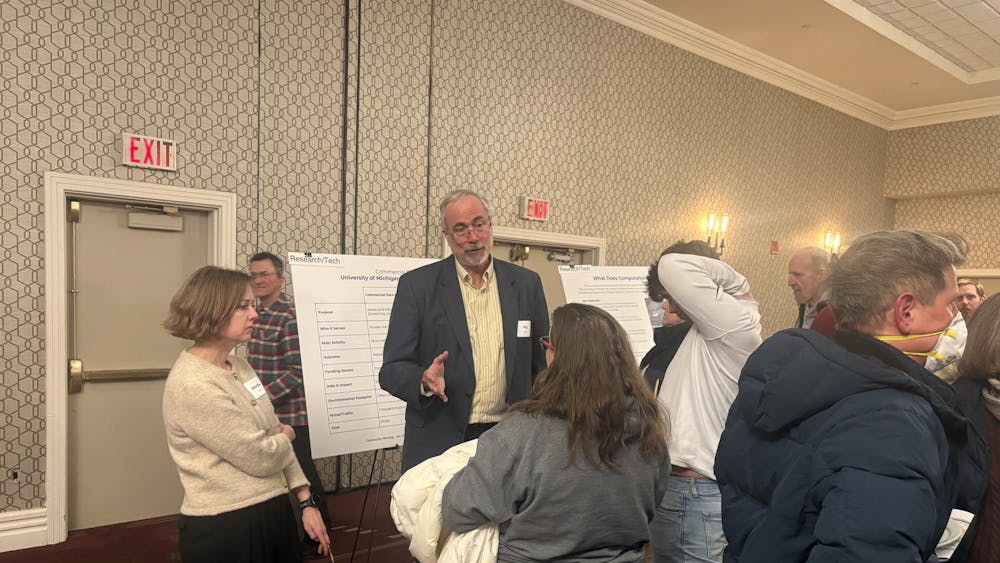Despite Monday’s march against Governor Snyder’s Public Act 4 being organized several miles from Eastern Michigan University’s campus, the anxieties for the economic situation at local, state and federal levels could be felt on campus.
Although the thematic content of Lani Guinier’s Keynote presentation and the proceeding luncheon was not manifestly concerned with economic turmoil, it seemed to be on the minds of many audience members.
Guinier’s speech in the Student Center Auditorium was the centerpiece of EMU’s commemoration of Martin Luther King Jr. Day. It was her second visit to EMU as the MLK Keynote Speaker.
The focus of her speech was the importance of “collective efficacy” in the struggle for social rights, which she examined through narrative of Dr. King’s struggle to convince both President Kennedy and President Johnson to draft what would ultimately become the Voting Rights Act of 1965.
Guinier described collective efficacy as “linking one’s fate with others.”
One of the people Guinier consistently referenced was Roger Wilkins, assistant attorney general to President Johnson. His significant role in the civil rights movement was heavily emphasized in her speech. Furthermore, his direct impact on her own life was made explicitly clear.
Guinier said after her 1993 nomination for assistant attorney general was revoked, Wilkins counseled her saying “’the most important lesson to learn from this is that Americans do not like victims. See yourself as a woman with a cause, not a grievance.’”
Guinier explained this theme in the larger context of Dr. King’s work, emphasizing that he pursued racial equality by making the civil rights movement a cause, instead of a collection of grievances. She related this back to her focus on collective efficacy, stressing that King’s cause was strengthened most when he linked his fate with those of many people who passionately shared his mission.
After Guinier’s speech, a Q-and-A session was held. One of the first to stand and address Guinier, was Sharon Claytor Peters, retired president and CEO of the advocacy group Michigan’s Children, and Roger Wilkins’ younger sister.
Peters appreciated her older brother’s presence in Guinier’s narrative.
“To hear her speak about his role today was very gratifying,” Peters said. “The way she framed his advice to her I thought was really excellent.”
Ypsilanti Mayor, Paul Schreiber, also rose to address Guinier. Schreiber asked Guinier what her thoughts were of Michigan’s Public Act 4, informally known as the emergency manager law.
This was an especially poignant moment, as protestors were at that moment gathering at Parker Mill Park to march to Governor Snyder’s house in Superior Township in demonstration against Public Act 4. Furthermore, there were concerns over the last year that Ypsilanti could be assigned an emergency manager.
Not being from Michigan, Guinier was understandably unfamiliar with Act 4. After it was explained to her, she emphasized the importance of collective efficacy in governance and seemed to feel the best way for communities to overcome financial crisis was for the citizens of those communities to work together.
This moment underscored the widespread economic anxieties that have been especially pervasive in Michigan over the last few years.
At the luncheon following the speech, these anxieties became more evident and more thoroughly intertwined with the theme of social justice associated with MLK Day.
While waiting for the luncheon to begin, Rebecca Sipe, director of the Honors College, expressed serious concern for the implications Public Act 4 has on social rights.
“For me, it’s raised lots of questions about how we can possibly have someone appointed to usurp the elected power in a community,” Sipe said. “The emergency manager issue seems to disenfranchise voters, regardless of who they are. There’s got to be a better way of providing assistance to local communities in making financial decisions then simply to usurp their power.
“A few months ago we were having discussions of, ‘Will Ypsilanti be next? Will this community be the next one that has an emergency manager appointed?’ The idea that someone from outside can make that kind of determination, that will literally usurp power from the local community, seems such a violation of our guaranteed rights as an electorate… We should be able to figure out a way where we can [make] advisers and support available to local communities to help collaborate on decision making, help them think about budgeting, help them think about different ways of revenue enhancement — without having to take their voice away.”
Once the majority of people in the packed Student Center Ballroom had finished
their lunch, several people, including Guinier, made speeches, some to commemorate the occasion with reflections on the importance of Dr. King’s work, and others to accept awards.
Senator Debbie Stabenow, spoke after accepting an MLK Honor Award. She said she believes if Dr. King were alive today, he would be marching to protest against “400 top Americans hav[ing] as much wealth as the bottom 150 million.”
Stabenow said she thinks the ‘system’ is rigged and that overcoming economic injustice is part of Dr. King’s challenge to the American people to foster social equality.
“There are too many people on the bottom and too many special deals for the people on the top,” she said. “Let us move on in these powerful days, these days of challenge, to make America the best it can be. I think that’s his challenge to us.”
After all of the speakers finished, a brief PowerPoint presentation was displayed. To a backdrop of slow emotive music, the slides showed human suffering from both social and economic injustice and natural catastrophe. The pictures ranged from nonviolent Occupy protestors being attacked by law enforcement to the recent
nuclear fallout in Japan. During the presentation, no one spoke.
Earlier in the day, before her pre-luncheon speech was over, Guinier summarized what MLK day meant to her and what she hoped to impart on the audience.
“The importance of Martin Luther King Day is not just to honor King, but to acknowledge this theme of linking one’s fate with others; drawing strength from the fact that there are people who are not only hearing you, but joining you in the struggle to make America the collective democracy that it should be, not just that it is or was.”










